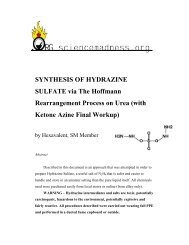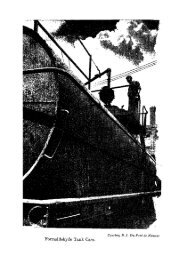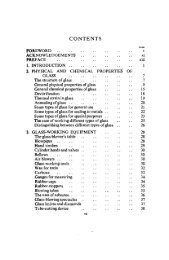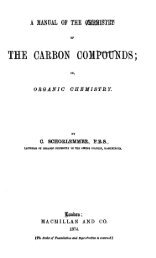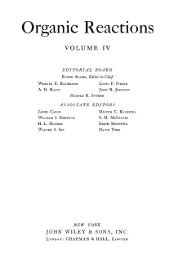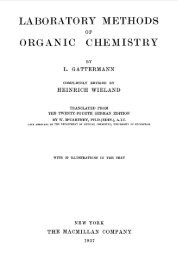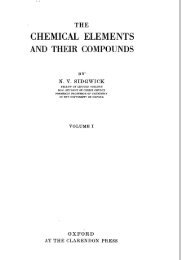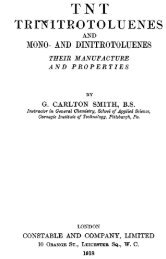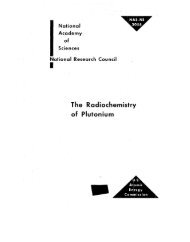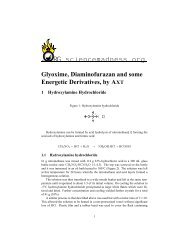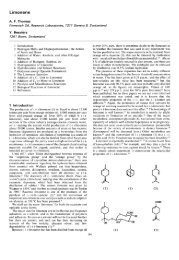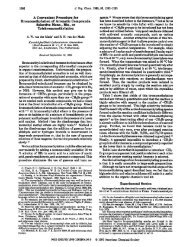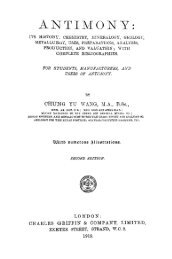- Page 1 and 2:
A COMPREHENSIVE TREATISE ON INORGAN
- Page 3 and 4:
A COMPREHENSIVE TREATISE ON INORGAN
- Page 5:
PREFACE THE publication of this, th
- Page 9 and 10:
AB BRE VIATIONS • aq. -• aqueou
- Page 11 and 12:
CHAPTER LXXIV PLATINUM § 1. The Hi
- Page 13 and 14:
PLATINUM 3 resembled the white meta
- Page 15 and 16:
PLATINUM 5 § 2. The Occurrence of
- Page 17 and 18:
PLATINUM i The platinum and iridosm
- Page 19 and 20:
PLATINUM 9 few places where its pre
- Page 21 and 22:
PLATINUM 11 of platinum have been n
- Page 23 and 24:
PLATINUM 13 platinum was reported b
- Page 25 and 26:
Russia. Colombia Borneo United Stat
- Page 27 and 28:
PLATINUM 17 Fogg. Ann., 34. 379, 18
- Page 29 and 30:
PLATINUM 19 1834 ; Journ. prakt. Ch
- Page 31 and 32:
PLATINUM 21 U.S. Oeol. Sur., 64, 18
- Page 33 and 34:
PLATINUM 23 centrates, 90 per cent,
- Page 35 and 36:
PLATINUM 25 the electric smelting o
- Page 37 and 38:
PLATINUM 27 mixed iridium and plati
- Page 39 and 40:
PLATINUM 29 sulphide ores. The drie
- Page 41 and 42:
PLATINUM 31 and the filtrate is tre
- Page 43 and 44:
PLATINUM 33 • R. A. Cooper and F.
- Page 45 and 46:
PLATINUM 35 and K. A. Dologoff, Jou
- Page 47 and 48:
PLATINUM 37 with hydrochloric acid
- Page 49 and 50:
PLATINUM 39 sodium dioxide ; the co
- Page 51 and 52:
PLATINUM 41 present, may persist fo
- Page 53 and 54:
PLATINUM 43 by filtration of the ho
- Page 55 and 56:
PLATINUM 45 is not likely to contai
- Page 57 and 58:
PLATINUM 47 •were also devised by
- Page 59 and 60:
PLATINUM 49 zation "were made. O. L
- Page 61 and 62:
PLATINUM 51 platinio chloride disso
- Page 63 and 64:
PLATINUM 53 22. 57, 1898 ; A. Gerha
- Page 65 and 66:
PLATINUM 55 soln. F. Henrich examin
- Page 67 and 68:
PLATINUM 57 hydrogen is oxidized to
- Page 69 and 70:
PLATINUM 59 KoIl. Zeit., 1. 162, 19
- Page 71 and 72:
PLATINUM 61 by the decomposition of
- Page 73 and 74:
PLATINUM 63 hammered metal ; P. Mus
- Page 75 and 76:
PLATINUM 65 respectively, 17,021, a
- Page 77 and 78:
PLATINUM 67 C. E. Guye and H. Schap
- Page 79 and 80:
PLATINUM 69 Acta, 4. 3, 1931 ; H. J
- Page 81 and 82:
PLATINUM 71 10-5 ; E. Becquerel, 7-
- Page 83 and 84:
PLATINUM 73 of magnesite by the oxy
- Page 85 and 86:
PLATINUM 75 after the twentieth ign
- Page 87 and 88:
PLATINUM 77 1 J. P. Andrews, Phil.
- Page 89 and 90:
PLATINUM 79 F. R. Caldwell and H. T
- Page 91 and 92:
PLATINUM 81 Observations were also
- Page 93 and 94:
PLATINUM 83 E. Ii. Nichols investig
- Page 95 and 96:
PLATINUM 85 G. T. Globe, P. Joye, G
- Page 97 and 98:
PLATINUM 87 metal in two forms, fir
- Page 99 and 100:
PLATINUM 89 increases ; but for fil
- Page 101 and 102:
PLATINUM 91 F. Ehrenhaft, Phys. Zei
- Page 103 and 104:
PLATINUM 93 Spectres electriques, P
- Page 105 and 106:
PLATINUM 95 Ann. Phys., (5), 6. 391
- Page 107 and 108:
PLATINUM 97 Sowjetunion, 5. 645, 19
- Page 109 and 110:
PLATINUM 99 Li. C. van Atta, R. S.
- Page 111 and 112:
PL.ATINUM 101 S. Bidwell studied th
- Page 113 and 114:
PLATINUM 103 against a soln. of sod
- Page 115 and 116:
PLATINUM 105 and the platinoplatini
- Page 117 and 118:
PLATINUM 107 W. Beetz found the rel
- Page 119 and 120:
PLATINUM 109 and V. N. Uspenskaya,
- Page 121 and 122:
PLATINUM 111 of chlorine in hydroch
- Page 123 and 124:
PLATINUM 113 then more slowly, reac
- Page 125 and 126:
PLATINUM 115 affect the optical pro
- Page 127 and 128:
PLATINUM 117 per sq. cm., and the c
- Page 129 and 130:
PLATINUM 119 platinum to the cold m
- Page 131 and 132:
PLATINUM 121 K. Noll, 0-37 ; W. H.
- Page 133 and 134:
PLATINUM 123 Observations on the ma
- Page 135 and 136:
PLATINUM 125 (4), 42. 150, 1871 ; W
- Page 137 and 138:
PLATINUM 127 Zeit. phys. Chem., 4.
- Page 139 and 140:
PLATINUM 129 trockenen festen Elekt
- Page 141 and 142:
PLATINUM 131 F.. 1. Spitalsky and V
- Page 143 and 144:
PLATINUM 133 durch Elektrolyse, Han
- Page 145 and 146:
PLATINUM 135 Rev. MU., 7. 348, 1910
- Page 147 and 148:
H8 3-65 8-65 PLATINUM 137 and hydro
- Page 149 and 150:
PLATINUM 139 Fig. 18. A. Sieverts a
- Page 151 and 152:
PLATINUM 141 by formaldehyde. The a
- Page 153 and 154:
PLATINUM 143 platinum, and hence in
- Page 155 and 156:
20° Oil O PLATIlTOM 145 of oxygen,
- Page 157 and 158:
PLATINUM 147 gas, by J. Bischof, 6
- Page 159 and 160:
PLATINUM 149 dioxide. R. Wright and
- Page 161 and 162:
PLATINUM 151 aq. soln. of chloric a
- Page 163 and 164:
PLATINUM 153 (ii) The condensed fil
- Page 165 and 166:
PLATINUM 155 mediate compound forme
- Page 167 and 168:
PLATINUM 157 exposure to sulphuric
- Page 169 and 170:
PLATINUM 159 G. M. Schwab and H. Sc
- Page 171 and 172:
PLATINUM 161 num. at 200°. O. J. W
- Page 173 and 174:
PLATINUM 163 observed that in a mix
- Page 175 and 176:
PLATINUM 165 E. C. "Phillips, P. Sa
- Page 177 and 178:
PLATINUM 167 fumaric acid, and redu
- Page 179 and 180:
PLATINUM 169 diminishes the resista
- Page 181 and 182:
PLATINUM 171 studied the reduction
- Page 183 and 184:
PLATINUM 173 resorcinol soln., redu
- Page 185 and 186:
PLATINUM 175 Akad. Wien, 104. 1171,
- Page 187 and 188:
PLATINUM 177 A. L. Ferguson and G.
- Page 189 and 190:
PLATINUM 179 H. G. Tanner and G. B.
- Page 191 and 192:
PLATINUM 181 39. 25, 1904 ; F. Weig
- Page 193 and 194:
PLATINUM 183 E. Mitseherlich, Pogg.
- Page 195 and 196:
PLATINUM 185 strong and T. P. Hildi
- Page 197 and 198:
PLATINUM 209, 1933; C. F. Schonbein
- Page 199 and 200:
PLATINUM 189 prakt. Chem., (1), 17.
- Page 201 and 202:
PLATINUM 191 and examples were also
- Page 203 and 204: PLATINUM 193 16. 357, 1877 ; (2), 2
- Page 205 and 206: PLATINUM 195 K. Honda and T. Ishiga
- Page 207 and 208: PLATINUM 197 he assumed that the in
- Page 209 and 210: ^55 ^S so -SJ 40 § ^ 35 PLATINUM 1
- Page 211 and 212: PLATINUM K. Hradecky observed that
- Page 213 and 214: PLATINUM 203 of platinum, from 1000
- Page 215 and 216: PLATINUM 205 susceptibility, in Fig
- Page 217 and 218: PLATINUM 207 T. Cooper prepared a p
- Page 219 and 220: PLATINUM 209 of a portion of the su
- Page 221 and 222: PLATINUM 211 •which are easily po
- Page 223 and 224: PLATINUM 213 or g=O-O38360+O-O52536
- Page 225 and 226: PLATINUM 215 by exposure to air ; a
- Page 227 and 228: PLATINUM 217 soln. are formed. E. I
- Page 229 and 230: PLATINTJM alloyed with a small prop
- Page 231 and 232: PLATINUM 221 platinum-ruthenium all
- Page 233 and 234: PLATINUM 223 A. TJ. Day and R. B. S
- Page 235 and 236: PLATINUM 225 A. Sieverts and co-wor
- Page 237 and 238: PL.ATINUM 227 and H. Gonnington, th
- Page 239 and 240: PLATINUM 229 REFEBBNCBS. 1 A. Brest
- Page 241 and 242: PLATINUM 231 O. Fromra, Ber., 27. 6
- Page 243 and 244: PLATINUM Zeit. phys. Chem., 67. 672
- Page 245 and 246: PLATINUM 235 § 17. The Lower Oxide
- Page 247 and 248: PLATINUM 237 IJ. Mond and co-worker
- Page 249 and 250: PLATINUM 239 H. Alexander prepared
- Page 251 and 252: PLATINUM 241 of hydrates, as !L. Wo
- Page 253: PLATINUM 243 platinic chloride ; C.
- Page 257 and 258: PLATINUM 247 metallic platinum and
- Page 259 and 260: PLATINUM 249 Ze.it. phya. Chem., 28
- Page 261 and 262: PLATINUM 251 § 21. Platinum Mono-,
- Page 263 and 264: PLATINUM 253 and L. T. Bourland fou
- Page 265 and 266: PLATINUM 255 oxide. The chloroplati
- Page 267 and 268: PLATINUM 257 and the adsorption of
- Page 269 and 270: PLATINUM presence of a large excess
- Page 271 and 272: PLATINUM the cold soln. from the pl
- Page 273 and 274: PLATINUM 263 more soluble than is t
- Page 275 and 276: PLATINUM 265 cis-salt into the tetr
- Page 277 and 278: PLATINUM 267 platinous nitrosodichl
- Page 279 and 280: PLATINUM hydrochloric acid, and tre
- Page 281 and 282: PLATINUM 271 chloride, [Ptpyn4]Cla.
- Page 283 and 284: PLATINUM 273 platlnous propylenedla
- Page 285 and 286: PLATINUM 275 with chloroform, descr
- Page 287 and 288: PLATINUM 277 trans- and cis-forms ;
- Page 289 and 290: PLATINUM 279 sulphite to a soln. of
- Page 291 and 292: PLATINUM 281 platinic acid to hydro
- Page 293 and 294: PLATINUM 283 The ruby-red, rhombohe
- Page 295 and 296: PLATINUM 285 also obtained. A. Wern
- Page 297 and 298: PLATINUM 287 REFERENCES. 1 M. C. Le
- Page 299 and 300: PLATINUM 289 and G. H. Wyatt, ib.,
- Page 301 and 302: PLATINUM 291 Bend., 161. 563, 1916
- Page 303 and 304: PLATINUM 293 hydrate at 215° in va
- Page 305 and 306:
PLATINUM 295 and K. Meyer studied t
- Page 307 and 308:
PLATINUM 297 brown coloration, prod
- Page 309 and 310:
PLATINUM 299 heirn and W. Levy obse
- Page 311 and 312:
PLATINUM 301 Dam observed that a dr
- Page 313 and 314:
PLATINUM 303 platinum is warmed wit
- Page 315 and 316:
PLATINUM 305 redaction proceeds ver
- Page 317 and 318:
PLATINUM 307 minochloroplatinite in
- Page 319 and 320:
PLATINUM 309 soluble in water ; and
- Page 321 and 322:
PLATINUM 311 W. Rudneff, A. Hies, a
- Page 323 and 324:
PLATINUM 313 F. W. O. de Coninck, H
- Page 325 and 326:
PLATINUM 315 Imidoazolyl-zi-mereapt
- Page 327 and 328:
PLATINUM 317 yellow colour is produ
- Page 329 and 330:
PLATINUM 319 and found that the X-r
- Page 331 and 332:
PLATINUM 321 when the salt is reduc
- Page 333 and 334:
PLATINUM 323 1OO grms. of soln., at
- Page 335 and 336:
PLATINUM 325 According to Li. N. Va
- Page 337 and 338:
PLATINUM 327 Ag2PtCl6, by melting s
- Page 339 and 340:
PLATINUM 329 two component chloride
- Page 341 and 342:
PLATINUM 331 tetramminochloroplatin
- Page 343 and 344:
PLATINUM 333 M. Slondel also obtain
- Page 345 and 346:
PLATINUM 335 to a cold, cone. soln.
- Page 347 and 348:
PLATINUM 337 insufficient quantity
- Page 349 and 350:
PLATINUM 339 AUi Accad. Lincei, (5)
- Page 351 and 352:
PLATINUM 341 Platinbasen, Konigsber
- Page 353 and 354:
PLATINUM 343 Zeit. Kryst., 14. 141,
- Page 355 and 356:
PLATINUM 345 15. 130, 1897 ; A. Wer
- Page 357 and 358:
PLATINUM 347 1895 ; A. Miolati, Zei
- Page 359 and 360:
PLATINUM 349 where • denotes the
- Page 361 and 362:
PLATINUM 351 (xiii) Quaterbutylamin
- Page 363 and 364:
PLATINUM 353 (lix) Bispropylatnined
- Page 365 and 366:
PLATINUM 355 (xv) Chlorotrimethylsu
- Page 367 and 368:
PLATINUM 357 (xxxix) Bisdiethylsulp
- Page 369 and 370:
PLATINUM 359 the potassium salt ; (
- Page 371 and 372:
PLATINUM 361 (x) Oxymesityls, [Pt(C
- Page 373 and 374:
PLATINUM 363 (xii) Diiodotetrammine
- Page 375 and 376:
PLATINUM 365 (xxiii) Dichlorontirit
- Page 377 and 378:
(liv) (Iv) (lvi) (lvii) (lviii) (li
- Page 379 and 380:
PLATINUM 369 (vii) Pentachlorodimet
- Page 381 and 382:
PLATINUM 371 mass by water, a littl
- Page 383 and 384:
PLATINUM 373 bromic acid, and cryst
- Page 385 and 386:
PLATINUM 375 is eliminated at a low
- Page 387 and 388:
PLATINUM 377 of platinous bromide a
- Page 389 and 390:
PLATINUM 379 H. Topsoe prepared cop
- Page 391 and 392:
PLATINUM 381 of sodium hydroxide in
- Page 393 and 394:
PLATINUM 383 dichlorodibromobisamid
- Page 395 and 396:
PLATINUM 385 the action of dry ammo
- Page 397 and 398:
PLATINUM 387 4©. 2585, 1907 ; .Ze*
- Page 399 and 400:
PLATINUM 389 colours the salt orang
- Page 401 and 402:
PLATINUM 391 acid. The trigonal cry
- Page 403 and 404:
PLATINUM 393 Bindefestigkeit der ne
- Page 405 and 406:
PLATINUM 395 absence of air, the so
- Page 407 and 408:
PLATINUM 397 product is then washed
- Page 409 and 410:
PIiATINUM 399 platinum black. The p
- Page 411 and 412:
PLATINUM 401 tetramminosulphate, an
- Page 413 and 414:
PLATINUM 403 hydroxytetramminosulph
- Page 415 and 416:
PLATINUM 405 tion of brown flecks,
- Page 417 and 418:
PLATINUM 407 »1. L>elepine, Compt.
- Page 419 and 420:
PLATINUM 409 of ammonium carbonate
- Page 421 and 422:
PLATINUM 411 soln. of platinic nitr
- Page 423 and 424:
PLATINUM 413 and "when the mixture
- Page 425 and 426:
PLATINUM 415 P. T. CIeve, E. A. Had
- Page 427:
PLATINUM 417 H2PO4.2H2O, to be form
- Page 430 and 431:
420 GENERAL INDEX Acqua toff ana, 9
- Page 432 and 433:
422 GENERAL, INDEX Allactite, 9. 4,
- Page 434 and 435:
424 Aluminium dimetasilicate ammoni
- Page 436 and 437:
426 GENERAL, INDEX Aluminium-sodium
- Page 438 and 439:
428 GENERAL, INDEX Ammonium amidose
- Page 440 and 441:
43O Ammonium chromic selenate, 10.
- Page 442 and 443:
432 GENERAL, INDEX Ammonium, diphos
- Page 444 and 445:
434 GENERAL, INDEX Ammonium hydroxy
- Page 446 and 447:
436 GENERAL, INDEX Ammonium nickel
- Page 448 and 449:
438 GENERAL, INDEX Ammonium potassi
- Page 450 and 451:
440 GENERAL, INDEX Ammonium tetrava
- Page 452 and 453:
442 GENERAL INDEX Amphoteric oxides
- Page 454 and 455:
444 GENERAIL, INDEX Antimony fluoni
- Page 456 and 457:
446 GENERAL, INDEX Arcanum duplicat
- Page 458 and 459:
448 GENERAL, INDEX Arsenic white, 9
- Page 460 and 461:
450 Aureus bromide, 3. 605, 606 bro
- Page 462 and 463:
452 GENERAL, INDEX Barium chloride
- Page 464 and 465:
454 Barium lead calcium fluoboryl d
- Page 466 and 467:
456 Barium salts, catalysis by, 1.
- Page 468 and 469:
458 GENERA Bayldonite, 7. 491 ; 9.
- Page 470 and 471:
46O GENERAL, INDEX Beryllium perehl
- Page 472 and 473:
462 GENERAL, INDEX Bismuth nitrate
- Page 474 and 475:
464 GENERAL INDEX Bleischweiff, 7.
- Page 476 and 477:
466 GENERAL INDEX Bose's swarm theo
- Page 478 and 479:
468 Butyl tetraehloroforrate, 14. 1
- Page 480 and 481:
470 GENERAL INDEX Cadmium hexadecab
- Page 482 and 483:
472 GENERAL. Cadmium tetramminobrom
- Page 484 and 485:
474 GENERAL, INDEX Caesium hydroxyp
- Page 486 and 487:
476 GENERAL, INDEX Cainosite, 5. 51
- Page 488 and 489:
478 GENERAL, INDEX Calcium dihydrop
- Page 490 and 491:
480 GENERAL, INDEX Calcium metaplum
- Page 492 and 493:
482 GENERAL INDEX Calcium sodium ma
- Page 494 and 495:
484 Caporeianite, 6. 738 soda, 6. 7
- Page 496 and 497:
486 GENERAL, INDEX Cathode, 1. 03 r
- Page 498 and 499:
488 GENERAL, INDEX Cerous hydrosulp
- Page 500 and 501:
49O GENERAL INDEX Cbloridizing roas
- Page 502 and 503:
492 GENERAL INDEX Chromic ca.rbaTni
- Page 504 and 505:
494 GENERAL, INDEX Chromic hoxacarb
- Page 506 and 507:
496 GENERAL INDEX Chromic sulphate
- Page 508 and 509:
498 GENERAL, INDEX Chromium monopho
- Page 510 and 511:
500 GENERAL, INDEX Chrysitine, 7. 6
- Page 512 and 513:
502 GENERAL, INDEX Cobalt e?>-dinit
- Page 514 and 515:
504 GENERAL INDEX Cobalt potassium
- Page 516 and 517:
506 GENERAL INDEX Cobaltic aquomtri
- Page 518 and 519:
608 GENERAL, INDEX Cobaltic brornob
- Page 520 and 521:
510 GENERAL, INDEX Cobalt ic chloro
- Page 522 and 523:
U- INDEX 512 GBNERi Cobaltic trans-
- Page 524 and 525:
514 GENERAL INDEX Co bait ic dinitr
- Page 526 and 527:
516 Cobaltic hydronitritoimidoctamm
- Page 528 and 529:
518 GENERAL, INDEX Cobaltic mercuri
- Page 530 and 531:
52O GENERAL, INDEX Cobaltic phospha
- Page 532 and 533:
522 GENERAL, INDEX Co foal tic tric
- Page 534 and 535:
524 (Jobaltous decamminoiodide, 14.
- Page 536 and 537:
526 GENERAL INDEX Cobaltyl sodium s
- Page 538 and 539:
528 GENERAL, INDEX "Cookeite, 2. 42
- Page 540 and 541:
53O GENERAL, INDEX Copper hexahydro
- Page 542 and 543:
532 GENERAL INDEX Copper potassium
- Page 544 and 545:
AX, INDEX 534 GENER. Copper ionic h
- Page 546 and 547:
536 GENERAL INDEX Cupric dihydrotet
- Page 548 and 549:
538 GENERAL INDEX Cuprosic sodium t
- Page 550 and 551:
540 GEISTER^ Cuprous triamminochlor
- Page 552 and 553:
542 GENERAL, INDEX Diaquobisethylen
- Page 554 and 555:
544 GENERAL. INDEX Dihydroxytetraio
- Page 556 and 557:
54:6 GENERAL INDEX Diuranyl ammoniu
- Page 558 and 559:
548 GENERAL INDEX Electrical discha
- Page 560 and 561:
550 GENERAL Erbium, 5. 696 ammonium
- Page 562 and 563:
552 GENERAL, I]STDEX F Facellite, 6
- Page 564 and 565:
554 GENERAT, INDEX Ferric felspar,
- Page 566 and 567:
556 GENERAL INDEX Ferric sodium hyd
- Page 568 and 569:
558 GENERAL , INDEX Ferrous chlorat
- Page 570 and 571:
56O GENERAL INDEX Ferrous rubidium
- Page 572 and 573:
562 Fluorine action chlorine, 2. 11
- Page 574 and 575:
564 GENERAL, INDEX Gadolinium nitra
- Page 576 and 577:
see Germanomolybdic acid, 11. 605 G
- Page 578 and 579:
568 GENERAL INDEX Gold nickel palla
- Page 580 and 581:
57O GENERAL INDEX Gun metals, 7. 34
- Page 582 and 583:
572 GENERAL, INDEX Hepatopyrites, 1
- Page 584 and 585:
574 Hydrates, 1. 397, 498 chemical,
- Page 586 and 587:
576 GENERAL. INDEX Hydrogen chlorob
- Page 588 and 589:
578 GENERAI. INDEX Hydrogen peroxid
- Page 590 and 591:
580 GENERAL INDEX Hydroxylamine iso
- Page 592 and 593:
582 GENERAL INDEX Indium chloroplat
- Page 594 and 595:
584 GENERA] Iridic sulphate, 15. 78
- Page 596 and 597:
586 GENERAL, INDEX Iridoua hydroxid
- Page 598 and 599:
588 GENERAL INDEX Iron germanium al
- Page 600 and 601:
59O GENERAL, INDEX Iron, reactions
- Page 602 and 603:
592 GENERAL Jacinta la bella, 6. 71
- Page 604 and 605:
594 GENERAL INDEX KoM, 9. 341 Kohle
- Page 606 and 607:
596 GENERAL, INDEX (hexa)lanthanum
- Page 608 and 609:
598 GENERAL INDEX Lead, cobaltic tr
- Page 610 and 611:
600 GENERAL INDEX Lead hydrazine th
- Page 612 and 613:
602 GENERi Lead platinum alloys, 16
- Page 614 and 615:
604 GENERAL INDEX (hexa)lead- tetra
- Page 616 and 617:
606 GENERAL INDEX Lithium bromobisa
- Page 618 and 619:
608 GENERAL INDEX Lithium platinum
- Page 620 and 621:
6IO GENBRAT, INDEX Magalaea sitiens
- Page 622 and 623:
612 GENERAL, INDEX Magnesium diboro
- Page 624 and 625:
614 Magnesium periodate, 2. 414 per
- Page 626 and 627:
616 GENERAL, INDEX Magnetism, 18. 2
- Page 628 and 629:
618 GENERAL, INDEX Manganese hydroa
- Page 630 and 631:
620 GENERAL, INDEX Manganic ammoniu
- Page 632 and 633:
622 GENERAL INDEX ManganouR hydro x
- Page 634 and 635:
624 GENERAL, INDEX Masrite, 12. 530
- Page 636 and 637:
626 GENEKAL INDEX Mercuric calcium
- Page 638 and 639:
628 Mercuric iodotrisulphate, 4. 97
- Page 640 and 641:
63O GENERAL, INDEX Mercuric tetramm
- Page 642 and 643:
632 GENERAL INDEX Mercurous selenat
- Page 644 and 645:
634 Metals, influence of planets on
- Page 646 and 647:
636 GENERAL, INDEX Mineral yellow,
- Page 648 and 649:
638 GENERAL INDEX Molybdenum iron a
- Page 650 and 651:
64O GENERAL INDEX Monometaphoaphate
- Page 652 and 653:
642 GENERAL, INDEX Neon, properties
- Page 654 and 655:
644 GENERAL, INDEX Nickel copper co
- Page 656 and 657:
646 Nickel metantimonate hexahydrat
- Page 658 and 659:
648 Nickel tetramminodinitrite, 8.
- Page 660 and 661:
65O Nigrica fabilis, 5. 713 Nigrine
- Page 662 and 663:
652 GENERAL INDEX Nitroxan, 8. 212
- Page 664 and 665:
654 GENERAL. INDEX Orthochromic aci
- Page 666 and 667:
656 GENERAL, INDEX Oxyacids of chlo
- Page 668 and 669:
658 Oxygen action sulphur trioxide,
- Page 670 and 671:
66O OENEKAIi INDEX Fallacious diars
- Page 672 and 673:
662 GENBRAI Ci INDEX Parameters top
- Page 674 and 675:
664 GEJNERAL, Permanganous molybdat
- Page 676 and 677:
666 GENERAL, INDEX Phosphon yellow
- Page 678 and 679:
668 GENERAL, INDEX Phototropic reac
- Page 680 and 681:
670 GENERAL, INDEX Platinio bisethy
- Page 682 and 683:
672 GENERAL INDEX !Platinic brornon
- Page 684 and 685:
674 Pla.tin.ic diiodobispyridinedia
- Page 686 and 687:
676 GENERAL. INDEX Platinic tetrach
- Page 688 and 689:
678 GENERAL, Platinous bis-a-amidop
- Page 690 and 691:
680 GBNEKAL INDEX Platinous bisprop
- Page 692 and 693:
682 GENERAL, INDEX Platinous diammi
- Page 694 and 695:
684 GENERAL Platinous diohloroethyl
- Page 696 and 697:
686 GENERAL. Platinous dithiophenyl
- Page 698 and 699:
Platinous pr opy lenediaminodiammin
- Page 700 and 701:
690 Flatinous tetramminooarbonate,
- Page 702 and 703:
692 GENERAL INDEX Platinum films, 1
- Page 704 and 705:
694 GENERAL INDEX Plumbic hexoxydis
- Page 706 and 707:
696 GENERAL INDEX Potassium ammoniu
- Page 708 and 709:
698 GENERAL, INDEX Potassium cerous
- Page 710 and 711:
700 GENERAL INDEX Potassium dibromo
- Page 712 and 713:
702 GENERAL INDEX Potassium ferrous
- Page 714 and 715:
704 GENERAL INDEX Potassium iodoper
- Page 716 and 717:
706 GENERAL, INDEX Potassium molybd
- Page 718 and 719:
708 GENERAL Potassium perdiborate,
- Page 720 and 721:
71O GENEKAL, INDEX Potassium stront
- Page 722 and 723:
712 GENERAL, INDEX Potassium trimol
- Page 724 and 725:
714 GENERAL INDEX Praseodymium fluo
- Page 726 and 727:
716 GBNBRAJ \ INDEX Pyridine molyfo
- Page 728 and 729:
718 GENERAL, INDEX Radium azide, 4.
- Page 730 and 731:
720 GENERAL INDEX Rhaphilite, 6. 82
- Page 732 and 733:
722 GENERAL INDEX Rhodium tricarbon
- Page 734 and 735:
724 GENERAL INDEX Rubidium cuprous
- Page 736 and 737:
726 Rubidium pyridinetriehloroplati
- Page 738 and 739:
728 GENERAL, INDEX Ruthenium nitros
- Page 740 and 741:
730 GENERAL, INDEX Samarous chlorid
- Page 742 and 743:
732 GENERAL. INDEX Selenatouranic a
- Page 744 and 745:
734 GENERAL INDEX Silia X-radiogram
- Page 746 and 747:
736 GENEBAL INDEX Silver amminofluo
- Page 748 and 749:
738 GENERAL, INDEX Silver fluotitan
- Page 750 and 751:
740 GENERAL INDEX Silver phosphatoh
- Page 752 and 753:
742 GENERAL, INDEX (hepta)silver te
- Page 754 and 755:
744: GENERAL INDEX Sodium ammonium
- Page 756 and 757:
746 Sodium chlorosmate, 15. 72O chl
- Page 758 and 759:
748 GENERAL INDEX Sodium dioxytetra
- Page 760 and 761:
750 GENERAL, Sodium hydroxide purif
- Page 762 and 763:
752 GENERAL, Sodium nickelous hexam
- Page 764 and 765:
754 Sodium praeodymium electrolytic
- Page 766 and 767:
756 Sodium thiosulphate pentahy dra
- Page 768 and 769:
758 GENERAL INDEX Solubility ion. t
- Page 770 and 771:
76O GENERAL INDEX Spraying, Scoop's
- Page 772 and 773:
762 GENERAL, INDEX Stannous nickel
- Page 774 and 775:
764 GENERAL INDEX Strcmtia labrador
- Page 776 and 777:
766 GENERAL INDEX Strontium nitride
- Page 778 and 779:
768 GENERAL INDEX Sulphates, acid,
- Page 780 and 781:
770 GENERAL INDEX Sulphuryl halides
- Page 782 and 783:
772 GENERAL. INDEX Telgstein, 6. 42
- Page 784 and 785:
774 GENERAL INDEX Tetramethylammoni
- Page 786 and 787:
776 GENERAIi INDEX Thallochabazite,
- Page 788 and 789:
778 GENEKAL Thallous triamminoiodid
- Page 790 and 791:
780 GENERAL INDEX Thorium lead, 7.
- Page 792 and 793:
782 GENEBAIi INDEX Tin manganeside,
- Page 794 and 795:
784 GENERAL INDEX Titanium sulphoch
- Page 796 and 797:
786 GENERAL INDEX Triethoxymonosila
- Page 798 and 799:
788 Tungsten fluorides, 11. 837 gol
- Page 800 and 801:
79O GENERAL Undercooling, 1. 450 (J
- Page 802 and 803:
792 GENERAL INDEX Uranous hexoxytet
- Page 804 and 805:
794 Uranyl salts, 12. 6O selenate,
- Page 806 and 807:
796 GENERAL INDEX Vanadium oxydifor
- Page 808 and 809:
798 Vitriolstein, 10. 351 Vitriolum
- Page 810 and 811:
800 GENERAL Wavellite, pseudo-, 5.
- Page 812 and 813:
802 GENERAL INDEX Youngite, 7. 797
- Page 814 and 815:
804 GENERAL INDEX Zinc azide basic,
- Page 816 and 817:
806 Zinc hydrotetrathionate, 10. 61
- Page 818 and 819:
808 GENERAL Zinc properties, physic
- Page 820 and 821:
810 GENERAL INDEX Zirconium analyti
- Page 822:
PRINTED IN ENGLAND BY WTLLIAM CLOWE



